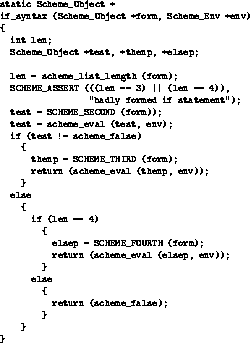
Figure 7: The if special form



The user can add new primitive syntax and special forms to
libscheme. A libscheme syntax form is implemented as a
C function that takes two arguments, an expression and an environment
in which the expression should be evaluated. The form is passed
directly to the syntax form with no evaluation performed. This allows
the syntax primitive itself to evaluate parts of the form as needed.
Figure 7 shows the implementation of the if special
form. Note that if cannot be implemented as a procedure
because it must not evaluate all of its arguments. The
scheme_eval() function evaluates a libscheme expression
with respect to a particular environment.
C functions that represent syntax forms are turned into Scheme objects
by passing them to the scheme_make_syntax() procedure which
returns a new object of type scheme_syntax_type.